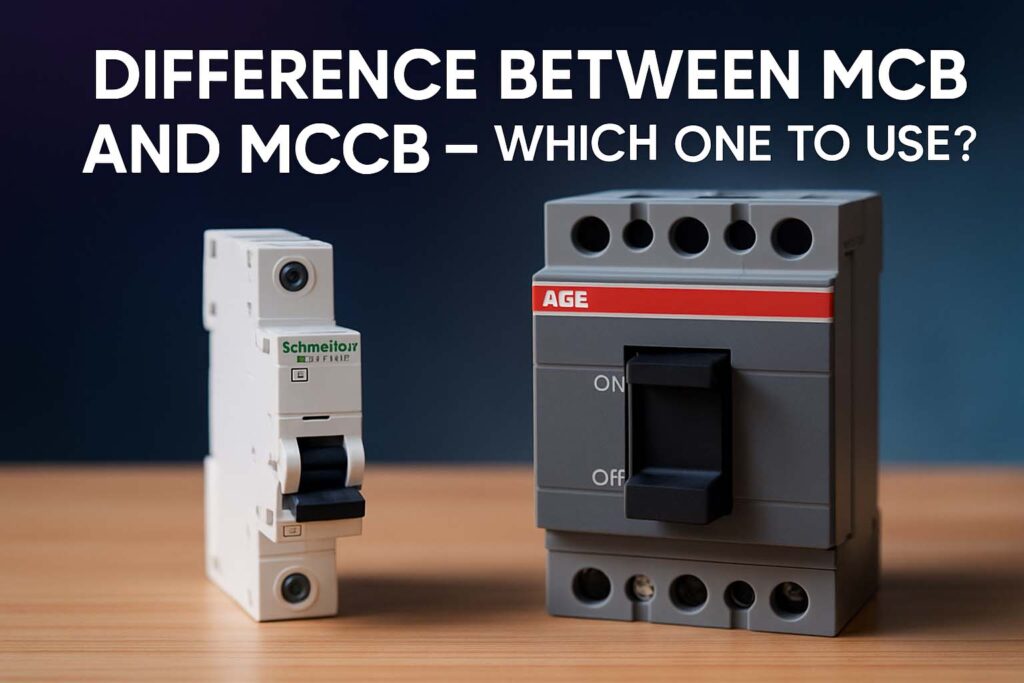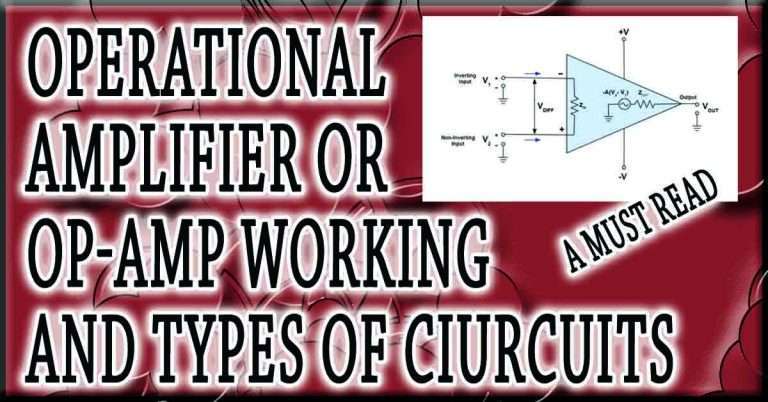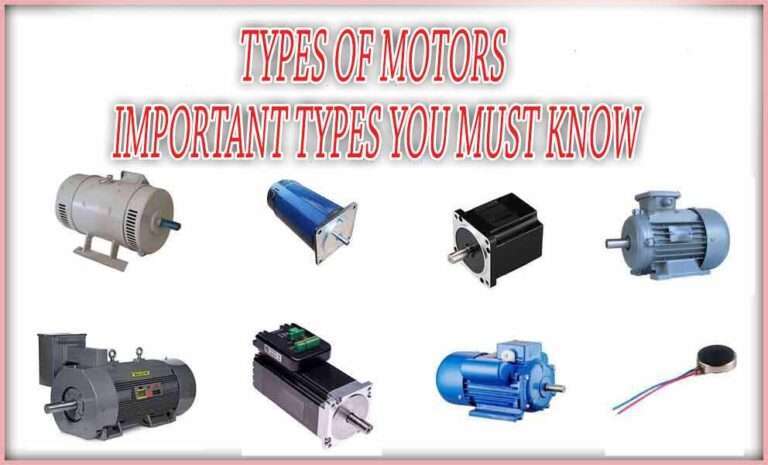Difference Between MCB and MCCB – Which One to Use?
If you’re planning a new electrical installation or upgrading an old one, you’ve likely come across two key terms — MCB (Miniature Circuit Breaker) and MCCB (Molded Case Circuit Breaker). Both play a critical role in circuit protection, but they are designed for different applications. Choosing the wrong one can lead to serious problems, like poor fault protection, nuisance tripping, or even fire hazards.
Table of Contents
Table of Contents

That’s why understanding the difference between MCB and MCCB is essential. Whether you’re a homeowner, engineer, or electrician, this guide will help you make an informed decision. In this article, we’ll explore MCB vs MCCB in detail. We’ll compare their functions, capacities, working principles, and usage. The aim is simple: help you decide which breaker is right for your application.
Key Takeaways
- MCB is ideal for low-power residential and small commercial systems.
- MCCB is best suited for high-power industrial and commercial setups.
- The main differences lie in capacity, interrupting ratings, and customization.
MCB vs MCCB – Breaker Comparison Overview
When it comes to circuit protection, both MCB and MCCB offer safety against overcurrent, short circuits, and faulty loads. But they are not interchangeable. Let’s understand them one by one before we dive into the detailed breaker comparison.
Know more about Transformer Protection Schemes: Types and Application Guide
What is MCB (Miniature Circuit Breaker)?
An MCB is an electromechanical device used to protect circuits up to 100 Amperes. It automatically switches off the electrical circuit during overload or short circuit conditions. It is primarily used in homes, offices, and light commercial applications. MCBs are compact, require no maintenance, and are designed to handle lower currents. They come in single-pole, double-pole, triple-pole, and four-pole variants.
What is MCCB (Molded Case Circuit Breaker)?
An MCCB, on the other hand, is designed for higher current ratings — usually from 100 Amperes up to 2500 Amperes. It offers adjustable trip settings and can protect circuits from both overload and short-circuit conditions. MCCBs are widely used in industrial applications, commercial complexes, and large machinery installations. They offer greater flexibility, customization, and interrupting capacity compared to MCBs.
Detailed Technical Comparison: MCB vs MCCB
Here’s a technical comparison to better understand the performance, design, and application differences between MCB and MCCB.
| Feature | MCB | MCCB |
|---|---|---|
| Full Form | Miniature Circuit Breaker | Molded Case Circuit Breaker |
| Current Rating | Up to 100 Amps | 100 Amps to 2500 Amps |
| Trip Characteristics | Fixed | Adjustable |
| Interrupting Capacity | Up to 10 kA | Up to 100 kA |
| Applications | Residential, Light Commercial | Industrial, High-Power Commercial |
| Size and Space Requirement | Small and Compact | Larger in Size |
| Maintenance | Minimal | Periodic Inspection Required |
| Cost | Low | Comparatively High |
| Mounting | DIN Rail | Panel Mounting |
| Remote Control Possibility | Not Available | Available |
| Protection Type | Thermal + Magnetic (Fixed) | Thermal + Magnetic (Adjustable) |
Know more about What Causes a Motor to Overload?
When to Use MCB – Ideal Scenarios
MCBs are perfect for homes and small buildings where the current demand is minimal and loads are predictable. Some common places where MCBs are used:
- Residential wiring circuits
- Light commercial buildings
- Office lighting panels
- Socket outlets and appliance circuits
The fixed trip settings make them easy to use, and their compact size ensures they fit perfectly in domestic DB boards. An important thing to note: If you’re installing a solar inverter or small UPS at home, an MCB can protect these devices if the current ratings are within limits.
When to Use MCCB – Suitable Use Cases
MCCBs are more suitable for high-current environments where trip settings need to be fine-tuned. They are ideal for:
- Industrial motor control centers
- Large commercial buildings
- Generator panels
- Large HVAC systems
- Elevator and escalator panels
If you’re working in an industrial plant or managing a commercial setup with large machines, using MCCBs provides higher fault tolerance and better coordination. The ability to adjust the overload and short circuit protection allows engineers to fine-tune the protection system according to the connected load — something that’s not possible with MCBs.
Know more about Earthing Transformer Working Principle
Breaker Comparison Based on Trip Settings
One major breaker comparison factor is the trip setting mechanism.
- MCBs come with fixed trip settings, usually based on the manufacturer’s standard curve (B, C, D curves).
- MCCBs offer adjustable trip settings, allowing better protection and selectivity for different types of loads.
This makes MCCB suitable for custom applications, motor loads, or sensitive electronic systems where precise protection is needed.
Current Carrying Capacity and Interrupt Rating
Another critical difference is in how much current each breaker can handle and interrupt safely:
- MCBs: Typically rated up to 100A with interrupting capacity up to 10kA.
- MCCBs: Start from 100A and go up to 2500A, with interrupting capacity up to 100kA.
This is essential for environments where high fault currents are possible — such as industrial plants with large transformers, generators, or high-capacity motors.
MCB vs MCCB in Terms of Cost and Maintenance
Cost is also a deciding factor. MCBs are cost-effective and suitable for low-budget installations. They require no maintenance and are easy to replace. MCCBs are more expensive due to their advanced features. They also require periodic maintenance and testing, especially in critical systems. However, the higher upfront cost of MCCBs is justified in scenarios where equipment and safety are at high risk.
Know more about IEC Standard for Air Circuit Breaker
Control and Monitoring Features
MCCBs can be equipped with advanced communication and monitoring options. This includes:
- Remote tripping
- Status monitoring
- Energy metering
- Alarm notifications
MCBs do not offer such features. So, if you need smart system integration or remote fault analysis, MCCB is the right choice.
Breaker Comparison Based on Installation
MCB:
- Installed on DIN rails.
- Compact and space-saving.
- Ideal for use in distribution boards (DBs).
MCCB:
- Mounted on panels with bolts.
- Requires more space.
- Needs proper heat dissipation due to higher current handling.
Which One Should You Use? MCB or MCCB
The answer depends on your specific application:
- For residential and light commercial use, where the load is consistent and under 100 Amps — use MCB.
- For industrial setups or commercial spaces where loads are heavy and variable, and trip settings need customization — use MCCB.
It’s also worth noting that MCCBs allow selective coordination, a feature important in multi-level protection systems, helping prevent nuisance tripping upstream.
Know more about Primary Injection Test vs Secondary Injection Test
Final Thoughts on MCB vs MCCB – Breaker Comparison Conclusion
The difference between MCB and MCCB comes down to three things — load current, fault level, and application environment. Use MCB if:
- Your load is under 100 Amps.
- You don’t need trip setting adjustments.
- You want a cost-effective, maintenance-free solution.
Choose MCCB if: - Your load exceeds 100 Amps.
- You require adjustable settings.
- The installation is in a critical or high-risk area.
Always consider fault current levels, environmental factors, and safety regulations before choosing your breaker. Making the right choice between MCB vs MCCB ensures not only electrical safety but also protects your equipment investment in the long run.
Follow Us on Social:
Subscribe our Newsletter on Electrical Insights for latest updates from Electrical Engineering Hub
#MCBvsMCCB, #CircuitBreaker, #ElectricalEngineering, #BreakerComparison, #ElectricalSafety, #MCB, #MCCB, #ElectriciansGuide, #HomeElectrical, #IndustrialElectrical, #PowerProtection, #ElectricalDevices, #ElectricalTips, #PanelBoard, #ElectricalLoad



Great website. Lots of useful info here. I’m sending it to
some buddies ans also sharing in delicious. And certainly, thanks to your sweat!